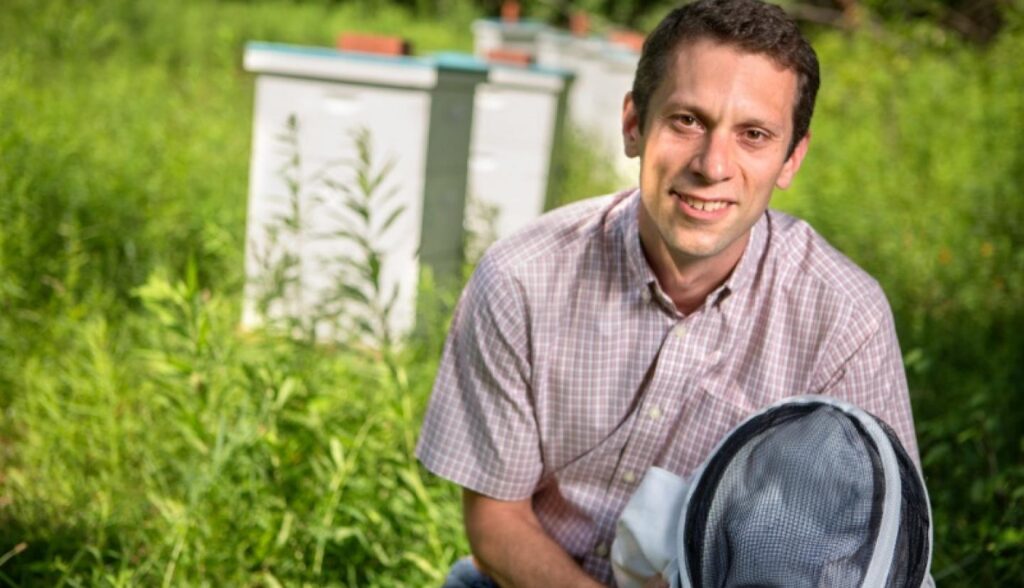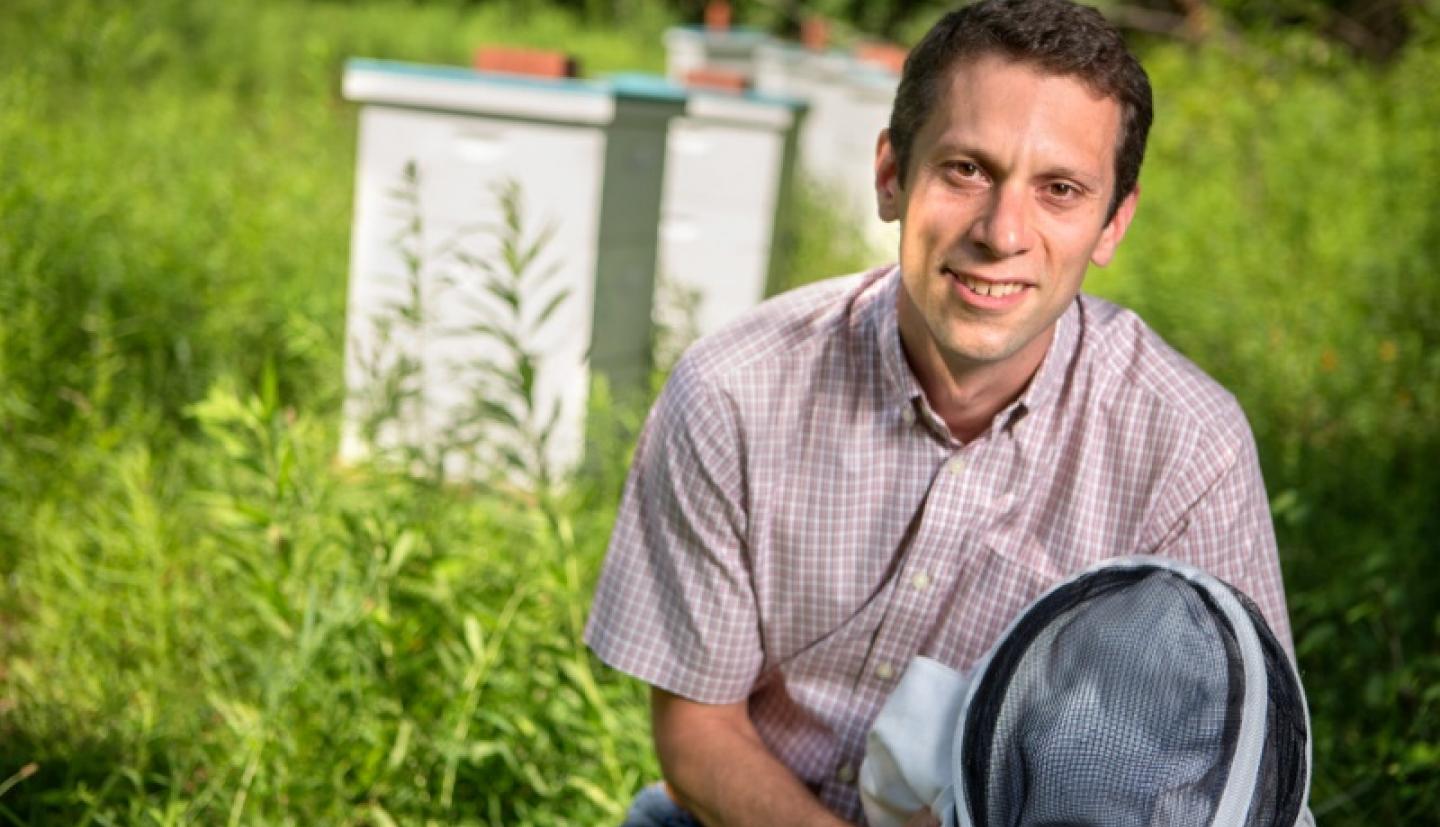You are not logged in. Please login TO VIEW THE RECORDING. Thanks!
DAY: Wednesday, June 14th, 2023 (2nd Wednesday of every month)
TIME: 6:30pm - 9pm
WHERE: via ZOOM.
LEARN - Pesticide risk to bees: What we know and what we need to know better
WHO - Scott McArt, assistant professor, entomology, Cornell
ADD TO YOUR CALENDAR: Google Calendar Outlook Calendar (.ics) Yahoo Calendar
| 6:30.pm.ET | Structured chat. Meet someone new! Learn something new! |
| 7:00.pm.ET | Jim Fraser tells us: How to Participate in the County Fair (Hint: It is FUN) |
| 7:30 pm.ET | GUEST SPEAKER |
TALK DESCRIPTION
Pesticide risk to bees: What we know and what we need to know better
What do we know about the impacts of pesticides and steps that regulatory agencies like the US Environmental Protection Agency (EPA) take to safeguard our pollinators? When is risk from pesticides high vs. low? Are protections from the EPA adequate or inadequate? This talk will dig into our team’s efforts to synthesize the science on this topic and interact with regulatory agencies, beekeepers, and farmers to ensure healthy bees while growing the food we all need to eat.
HINT: Don't scramble to write down webpages Scott mentions. The are right here:
- Cornell Chemical Ecology Core Facility (pesticide analysis that’s open to the public): https://blogs.cornell.edu/ccecf/
- New York neonicotinoid insecticide cost-benefit analysis: https://cornell.box.com/v/2020-neonicotinoid-report
- New York Birds and Bees bill: https://www.nysenate.gov/legislation/bills/2023/A3226
- American Bee Journal Notes from the Lab columns: https://blogs.cornell.edu/mcartlab/notes-from-the-lab/
- Cornell pollinator protection guides: https://cals.cornell.edu/pollinator-network/conservation/pollinator-protection-guides
TUNE-IN TO LEARN...
- What pesticide risks do your bee face?
- What pesticides are the problem?
- How can you keep your bees safe?
- Why do we even need pesticides?
SPEAKER BIO
"The use of synthetic chemical pesticides is central to current agricultural practices worldwide," McArt says in his abstract. "But what is the cost to wildlife via non-target exposures? This talk will summarize when there's risk to bees, when there isn't, and what types of research are most likely to influence farmers, regulatory agencies, and policy makers."
McArt, who joined the Cornell faculty in 2017, focuses his research on pollinator health and ecology. His areas of expertise include disease ecology, ecotoxicology, community ecology, chemical ecology, and plant-pollinator interactions. He maintains his lab research site at https://blogs.cornell.edu/mcartlab/.
"Research in our lab focuses on the impact of pesticides, pathogens, and habitat on honey bees and wild bees," he writes on his website. "We are particularly interested in scientific research that can inform management decisions by beekeepers, growers and the public. Current research projects include: 1) Understanding pesticide exposure and risk to bees in multiple land management contexts, 2) Combining empirical data with network modeling to understand pathogen transmission in complex plant-pollinator networks, and 3) Understanding how habitat enhancements (e.g., flowers at solar power sites) impact pollinator populations and the services they provide to agriculture."
McArt's duties at Cornell also include director of the Cornell Chemical Ecology Core Facility, and associate curator of the Cornell University Insect Collection.
He writes a monthly column, Notes from the Lab, in American Bee Journal; each month he summarizes scientific publications for a non-scientific audience. "The goal is to make the emerging pollinator health science more approachable and relevant to beekeepers," he says.
He is also a member of the New York State (NYS) Beekeeper Tech Team, which works directly with NYS beekeepers to improve honey bee health, reduce colony losses, and increase profitability of the state's beekeeping industry: https://pollinator.cals.cornell.edu/nys-beekeeper-tech-team/
In addition, McArt coordinates such beekeeping workshops as "Introduction to Honey Bee Queen Rearing" and "Honey Bee Biology and Disease Management for Veterinarians" and engages with growers regarding pesticide risk to bees and creating pollinator-friendly habitat. His extension materials are onsite.
When asked "What gets you out of bed in the morning?" during a new faculty interview, he responded "Most of the factors contributing to declines in bee health (pesticide exposure, lack of floral resources, disease, inadequate management practices) are preventable. With targeted research efforts and educated stakeholders, regulatory agencies and public, we can make a difference."
McArt holds a bachelor of arts degree in environmental and evolutionary biology (2001) from Dartmouth College, Hanover, N.H., and a master's degree in biological sciences (2006) from the University of Alaska, Anchorage. He received his doctorate in entomology in 2012 from Cornell University. He served as a USDA-NIFA (National Institute of Food and Agriculture) postdoctoral fellow at the University of Massachusetts, Amhurst, in 2014, and then as a research scientist at Cornell from 2014 to 2017, before joining the Cornell faculty.
(Bio written by Kathy Keatley Garvey
Learn More about Scott McArt HERE

Zoom Details
To dial in from a voice-only phone line:
Phone #: 1-301-715 -8592
Meeting ID: 879 8909 4834
Passcode: 873046
One tap mobile (paste entire string into your phone's send field) +13017158592,,87989094834#,,,,*873046#
To access the meeting via computer or smartphone:
Zoom link: https://us02web.zoom.us/j/87989094834?pwd=MmFJYUVEbHRaRkI3b2R4QnJaNDhNQT09
Need HELP with Zoom? CLICK HERE to reach out to Mike Hurst, MCBA's zoom troubleshooter.

